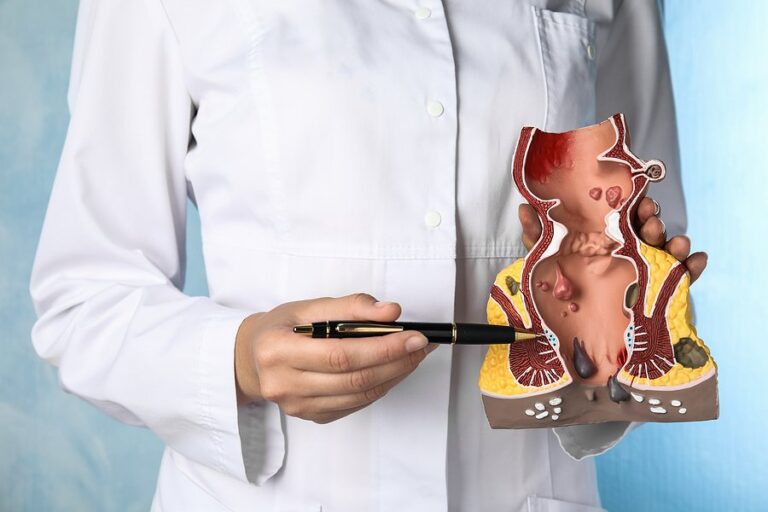Hemorrhoids, sometimes referred to as piles, are enlarged veins in the rectum and anus. These vessels’ walls may get inflamed as they extend.
Piles can occasionally be uncomfortable, although they frequently go away on their own. Increased fiber consumption and regular exercise can aid with symptom relief and reduce the likelihood of developing Piles in the future.
In case your symptoms are too severe and the home remedies are not effective, you may consider seeing a specialist. In India, one could search for the best general physician in Bangalore, Mumbai, or Delhi as these cities are known for their cost-efficient treatment.
What are the symptoms of piles?
Piles frequently cause these symptoms:
- Bleeding
- Itching or discomfort in the anal region,
- Pain, ache, or soreness near the anus
- Anal region tumours and swelling
- Dilatation, or bulging, of a vein, which, depending on where it happens, may or may not be unpleasant.
Symptoms may be unsettling or concerning, but after a few days, they frequently go away on their own.
What are the causes of piles?
Piles can develop for the reasons listed below, despite the fact that doctors do not completely understand why they do so:
- Pregnancy: During pregnancy, hormones cause veins to relax and expand. Rectal tissues also weaken. Up to 35% of pregnant women may have piles.
- Age: Adults over the age of 50 are more likely to get Piles. However, kids and teenagers can also contract them.
- Diarrhea: Piles can develop following episodes of persistent diarrhea.
- Chronic constipation: Struggling to pass feces puts extra strain on the blood vessel walls, which can lead to Piles.
- Sitting for long: Too much time spent sitting down, especially when using the restroom, might result in Piles.
- Diet: Consuming meals deficient in fiber may make hemorrhoids more likely.
- Weightlifting: Hemorrhoids can develop by repeatedly lifting large things.
- Anal sex: This might result in new haemorrhoids or make existing ones worse.
- Weight: Studies have shown a correlation between having hemorrhoids and being overweight. This can be the result of elevated abdominal pressure.
- Genetics: Hemorrhoids are a condition that certain people are predisposed to.
Treatment for piles
Simple treatments will typically relieve symptoms while piles cure on their own. However, in some circumstances, treatment with drugs or surgery may be required. In that case it is best to consult your nearest internal medicine hospital.
- Treatments at home
The following at-home remedies might aid in reducing piles’ signs and symptoms:
- Topical creams and ointments: OTC treatments for external piles can aid in reducing swelling, itching, and irritation.
- Fiber supplements: Fiber supplements can aid with piles and relieve constipation. Examples include methylcellulose (Citrucel) and psyllium (Metamucil).
- Ice packs and cold compress: Applying cold compresses and ice packs to the injured region may help reduce discomfort.
- A sitz bath: Sit in a warm, shallow tub of water while taking a sitz bath. One taken many times a day could help lessen hemorrhoid discomfort.
- Analgesics: Painkillers such acetaminophen, aspirin, and ibuprofen can help reduce the discomfort associated with piles.
- Medications
There are several different types of hemorrhoid treatments, including suppositories, ointments, and pads. Typically, one may get them from a store.
Several typical drugs consist of:
- Zinc oxide: Creams with zinc oxide may be useful in treating inflammation. One cream, Calmoseptine, mixes menthol and zinc oxide. Anal irritation, which can be brought on by haemorrhoids, may be relieved by it with some success.
- Witch hazel: Astringents like witch hazel, according to experts, can offer momentary relief.
- Steroid cream: Hemorrhoids are frequently treated with steroid cream, which contains corticosteroids like hydrocortisone. They can aid in reducing inflammation, but prolonged usage could result in skin damage.
- Lidocaine: As a local anesthetic, lidocaine works. According to research, creams or suppositories that include lidocaine plus the anti-inflammatory tribenoside may help alleviate sensations of discomfort and itching.
If symptoms persist after taking these drugs for a week, a person should consult a doctor.
- Non-surgical Options
If at-home treatments for piles are ineffective, more medical intervention may be required. Non Surgical alternatives include of:
- Rubber band ligation: To stop the flow of blood to an internal hemorrhoid, an elastic band is placed on its base during this outpatient operation. Either the hemorrhoid will get smaller or fall off.
- Sclerotherapy: a liquid is injected by medical professionals into an internal hemorrhage. This results in a scar that stops the hemorrhoid’s blood flow, causing it to shrink.
- Infrared photocoagulation: When an internal hemorrhoid is exposed to infrared light, the region is heated, which leads to the formation of scar tissue. By cutting off the hemorrhoid’s blood supply, this shrinks the hemorrhage.
- Electrocoagulation: Doctors use electrocoagulation to scar a hemorrhoid by injecting a small electric current into it. The hemorrhoid shrinks as a result of the scar tissue’s blockage of the blood supply.
These procedures are typically performed by a doctor while the patient is sedated with local anesthesia.
- Surgical options
Both prolapsed internal piles and external piles may be completely removed during surgery. Hemorrhoidectomy is the medical term for this treatment.
An alternative is to staple a prolapsed hemorrhoid back into the anus by a physician or surgeon.
Anesthesia will be given to the patient throughout these operations. Most patients are able to return home the same day as their operation.
About 50% of persons over the age of 50 suffer from piles, which are a prevalent condition. Even while symptoms could hurt, they frequently go better after several days of home remedies. A change in lifestyle might also aid in preventing piles.
A person could require medical care if problems arise if hemorrhoid symptoms continue after one week. If specific symptoms develop, notably significant bleeding, excruciating pain, or fever, one should see a physician. These could be symptoms of different ailments.


Comments are closed.